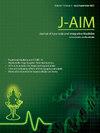Polyherbal formulation mitigates age-associated cognitive deficits in rats
IF 1.9
Q3 INTEGRATIVE & COMPLEMENTARY MEDICINE
引用次数: 0
Abstract
Background
Age-related cognitive decline is a common biological phenomenon that appears to be driven by accelerated oxidative stress pathways. As natural polyherbal phytoconstituents positively modulate such pathological changes, herbal formulations are gaining notable attention in the mitigation of age-associated cognitive impairments.
Objectives
To study the effect of polyherbal extracts on cognitive functions in 52–54 weeks old rats compared to young adult rats.
Material and methods
The anxiety as well as learning and memory functions were assessed employing elevated plus maze, Morris water maze (MWM), and novel object recognition test (NORT). The levels of antioxidant enzymes, acetylcholinesterase (AChE), neurotransmitters, cytokines, and brain-derived neurotrophic factor (BDNF) were estimated in blood and/or brain samples using biochemical assays, LC−MS/MS, ELISA, and immunofluorescence methods.
Results
The peroral administration of polyherbal plant extracts for 12 weeks showed trends toward improvement of learning and memory functions in the MWM and/or NORT in 52–54 weeks old rats. The locomotor activity and anxiety-like behavior remained similar in young vs. aged rats. We noted lowered levels of antioxidant enzymes (superoxide dismutase, catalase, reduced glutathione, glutathione peroxidase, and homocysteine) and AChE in the frontal cortex of brain and/or blood samples of 52–54 weeks old rats. We also observed the negative impact of aging on the levels of neurotransmitters (dopamine, noradrenaline, and 5-HT), cytokines (TNF-α, IL-6, and CRP), BDNF, and NeuN expression in the hippocampus/frontal cortex in 52–54 weeks old rats vs. young rats. The altered levels of these antioxidant enzymes, AChE, neurotransmitters, cytokines, and other biogenic substances were reversed in polyherbal-recipient rats.
Conclusions
Our results indicate that the memory-improving activity of polyherbal formulation may be attributed to antioxidant, anti-inflammatory, and neuroprotective properties. Thus, we suggest the utility of this Indian polyherbal formulation in delaying the onset or reducing age-associated cognitive impairments.

多草药配方减轻大鼠年龄相关的认知缺陷
与年龄相关的认知能力下降是一种常见的生物学现象,似乎是由加速氧化应激途径驱动的。由于天然多草药植物成分积极调节这种病理变化,草药配方在减轻与年龄相关的认知障碍方面得到了显著的关注。目的研究中药提取物对52 ~ 54周龄大鼠认知功能的影响。材料与方法采用升高+迷宫、Morris水迷宫和新物体识别测试评估大鼠的焦虑和学习记忆功能。采用生化分析、LC - MS/MS、ELISA和免疫荧光法测定血液和/或脑样品中抗氧化酶、乙酰胆碱酯酶(AChE)、神经递质、细胞因子和脑源性神经营养因子(BDNF)的水平。结果52 ~ 54周龄大鼠口服多药提取物12周后,MWM和(或)NORT的学习记忆功能有改善的趋势。运动活动和焦虑样行为在年轻大鼠和老年大鼠中保持相似。我们注意到52-54周龄大鼠大脑额叶皮层和/或血液样本中抗氧化酶(超氧化物歧化酶、过氧化氢酶、还原性谷胱甘肽、谷胱甘肽过氧化物酶和同型半胱氨酸)和乙酰胆碱酯酶水平降低。我们还观察了衰老对52-54周龄大鼠海马/额叶皮层中神经递质(多巴胺、去甲肾上腺素和5-HT)、细胞因子(TNF-α、IL-6和CRP)、BDNF和NeuN表达水平的负面影响。这些抗氧化酶、乙酰胆碱酯酶、神经递质、细胞因子和其他生物物质水平的改变在多草药受体大鼠中被逆转。结论复方具有抗氧化、抗炎和神经保护作用,具有改善记忆的作用。因此,我们建议使用这种印度多草药配方来延缓发病或减少与年龄相关的认知障碍。
本文章由计算机程序翻译,如有差异,请以英文原文为准。
求助全文
约1分钟内获得全文
求助全文
来源期刊

Journal of Ayurveda and Integrative Medicine
INTEGRATIVE & COMPLEMENTARY MEDICINE-
CiteScore
4.70
自引率
12.50%
发文量
136
审稿时长
30 weeks
 求助内容:
求助内容: 应助结果提醒方式:
应助结果提醒方式:


